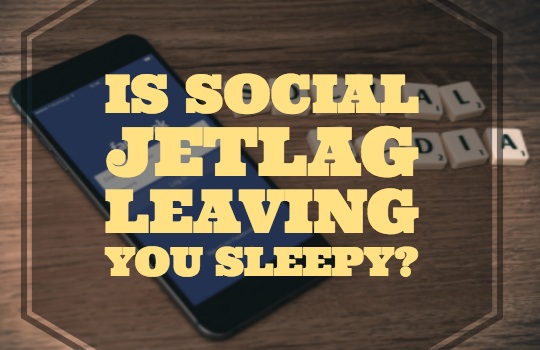Is Social Jetlag Leaving You Sleepy?
7th Oct 2021

Do you struggle to get out of bed when your alarm goes off on Monday morning, making vague grumblings about Mondayitis or lamenting the fact you always seem to be starting your week off on the wrong foot?
If so, chances are you’re experiencing ‘social jetlag’, a phenomenon tied to the differences in sleep timing between our weekdays and weekends. If you’re thinking that’s an unnecessarily dramatic name for something so simple, you might be surprised to discover just how much of an impact it can have on our day to day functioning and long-term wellbeing.
What exactly is social jetlag?
It’s no secret most of us tend to stay up a little later on Friday and Saturday nights. Safe in the knowledge we get to sleep in the following morning, our standard bedtime goes out the window as we binge watch seven episodes of The Good Wife, treat ourselves to a dinner with friends, or unearth a particularly enjoyable bottle of wine.
While we may send ourselves to bed a little earlier on Sunday, it can often be hard to drift off to sleep, thanks to the fact our body clocks have quickly adjusted to our weekend time zone, and are wrongly assuming we’ll be able to sleep in again on Monday morning.
It’s this cycle that leaves us sleepy, cranky, and a little disoriented when our alarms go off at the start of the working week.
How does it affect you?
The effects of social jetlag are surprisingly similar to those caused by traditional jetlag (i.e. travel across time zones): you just haven’t had the trip to Paris that makes them feel justified. This is because the phenomenon messes with our circadian rhythms in exactly the same way, confusing all those processes our bodies rely on to tell us when to sleep, rise, and eat.
According to the American Academy of Sleep Medicine, social jetlag is associated with poorer health, worse mood, and increased sleepiness and fatigue. Sufferers are more likely to smoke, be overweight or obese, and experience depression. Even more shockingly, each hour of social jetlag (e.g. if your alarm goes off at 7am on weekdays but you usually wake up around 8am on weekends) is associated with an 11% increase in the likelihood of heart disease (you can read more about these stats here).
As you can see, it’s a pretty big deal.
What can you do to avoid it?
The solution to the problem is exactly what you’d expect: maintaining similar sleep and wake times seven days a week. This is more easily said than done, of course, given late night activities and relaxed routines are generally considered hallmarks of a good weekend.
Another issue is the pace of modern life and ever-expanding work hours; both of which are reducing the amount and quality of sleep we’re getting as a nation. (A 2016 report by the Sleep Health Foundation showed 45% of Australian adults are affected by inadequate sleep - significantly more than in previous years.)
Keeping these two factors in mind, the best way to avoid social jetlag is through weekend power naps. These provide all the benefits of a sleep in (and allow you to catch up on sleep debt) without putting your body clock out of whack.
Before you set yourself up on the sofa for a little daytime snooze, remember the optimal length for a power nap is either 30 or 90 minutes - anything in between is likely to leave you feeling worse for wear when you wake up, thanks to the fact you’ll wake up around halfway through an REM cycle.
If you swap out your Saturday sleep in for an afternoon power nap, you won’t only be making Monday easier: you’ll also be setting yourself up for a happier, healthier future.

 Bedroom Clearance
Bedroom Clearance







 Australian Dollar
Australian Dollar
 New Zealand Dollars
New Zealand Dollars
 US Dollars
US Dollars
